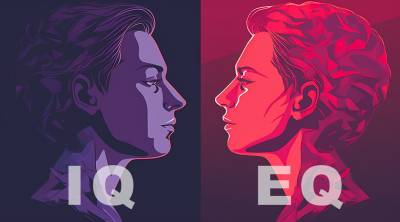What is IQ?

Definition of IQ (Intelligence Quotient) or What IQ Means?
The Intelligence Quotient, commonly known as IQ, is a scientific assessment designed to measure human intelligence. It quantifies cognitive abilities based on a score derived from standardized tests. These tests are crafted to evaluate a range of mental capacities, such as logical reasoning, abstract thinking, problem-solving, and memory. The IQ score is a tool used by psychologists and educators to understand an individual's intellectual capabilities relative to the general population.
What is a Good IQ Level?
A good IQ level is typically considered to be around the average score of 100, according to the standard distribution of IQ scores. The IQ scale is designed so that most people (about 68%) score within one standard deviation of the mean, which translates to scores between 85 and 115. Scores above 130 are classified as 'superior intelligence,' and about 2.1% of the population falls into this category. These individuals often demonstrate exceptional analytical and problem-solving abilities.
Conversely, scores below 70, which are attained by approximately 2.1% of the population, are often categorized as indicating 'challenges in cognitive development.' This range may require special educational support. It's crucial to recognize that IQ is not a definitive measure of a person's intellectual capabilities or potential. Other factors, such as creativity, emotional intelligence, practical skills, and various life experiences, also play significant roles in personal and professional success.
Brief History of IQ
The concept of IQ originated in the early 20th century with the work of psychologists like Alfred Binet and Theodore Simon. Their goal was to measure cognitive abilities in children to identify those needing special educational programs. Read more about IQ Test History.
How IQ is Measured
Overview of Standardized IQ Tests
Standardized IQ tests are meticulously designed tools used to measure a person's intelligence quotient in a consistent, reliable, and unbiased manner. These tests assess various cognitive skills, including logical reasoning, pattern recognition, mathematical ability, spatial awareness, and verbal skills. The main objective is to provide a quantitative measure of intelligence that can be compared across individuals and populations.
IQ tests are structured to assess both fluid intelligence—the ability to think abstractly and solve problems—and crystallized intelligence, which involves using skills, knowledge, and experience. This duality ensures a comprehensive evaluation of a person's cognitive abilities.
Standardized IQ tests are carefully normalized. This means that the tests are administered to a large, representative sample of people under similar conditions, and the results are used to establish norms or average scores for different age groups. These norms are critical for interpreting individual scores in a meaningful way.
The tests are also designed to minimize cultural, linguistic, and socioeconomic biases as much as possible, although this remains an ongoing challenge in the field of psychometrics. The goal is to ensure that an individual's score reflects their true cognitive ability, rather than their familiarity with specific cultural or educational contexts.
Each standardized IQ test has its distinct methodology and areas of focus. Some prioritize verbal reasoning and linguistic skills, while others might emphasize logical reasoning and pattern recognition. This diversity allows for a broader understanding of intelligence and caters to different assessment needs, such as educational placement, clinical evaluation, or research purposes.
Overall, standardized IQ tests are a crucial tool in the field of psychology and education, providing valuable insights into individual cognitive strengths and areas for development. They continue to evolve with advancements in our understanding of the human brain and intelligence.
Examples of Popular IQ Tests
IQ tests vary in their approach and focus, but each aims to provide a reliable measure of intelligence. Below is a table detailing some of the most widely recognized IQ tests, highlighting their key characteristics and areas of focus:
| IQ Test | Developer | Year Developed | Focus Areas | Notable Features |
|---|---|---|---|---|
| Stanford-Binet Intelligence Scales | Lewis Terman (revision of Binet-Simon Scale) | 1916 | Verbal and non-verbal intelligence | Age-based and point-scale formats, assessing five factors: fluid reasoning, knowledge, quantitative reasoning, visual-spatial processing, and working memory |
| Wechsler Adult Intelligence Scale (WAIS) | David Wechsler | 1955 | General intelligence and cognitive ability | Consists of verbal comprehension, perceptual reasoning, working memory, and processing speed. Known for its separate scores for verbal and performance IQ |
| Raven's Progressive Matrices | John C. Raven | 1936 | Abstract reasoning and non-verbal intelligence | Uses non-verbal abstract problems, widely used in diverse cultures due to its non-linguistic nature |
| Woodcock-Johnson Tests of Cognitive Abilities | Richard Woodcock and Mary E. Bonner Johnson | 1977 | Broad cognitive abilities | Comprehensive test covering various intelligence domains, including cognitive abilities, oral language, and academic achievement |
These tests are used globally and have undergone several revisions to improve accuracy and inclusivity. They are typically administered by psychologists or trained professionals and are used in a variety of settings, including schools, clinical environments, and for research purposes.
Factors Influencing IQ
A myriad of factors influence a person's IQ. Understanding these factors is crucial in comprehending the full scope of intelligence quotient development. The table below breaks down these influences into two primary categories: genetic factors and environmental factors, providing a more nuanced view.
| Factor Type | Specific Factors | Description |
|---|---|---|
| Genetic Influences | Heredity | The genetic makeup inherited from parents plays a crucial role in determining potential intelligence. |
| Genetic Disorders | Certain genetic conditions, like Down syndrome, can affect cognitive abilities and hence impact IQ. | |
| Brain Structure | Variations in brain structure and function, influenced by genetics, can affect cognitive capabilities. | |
| Environmental Influences | Prenatal Environment | Factors like maternal nutrition and health during pregnancy can affect fetal brain development. |
| Early Childhood Development | The quality of early childhood care, including nutrition, stimulation, and bonding, impacts cognitive growth. | |
| Education and Learning Opportunities | Access to quality education and learning resources can significantly enhance cognitive abilities. | |
| Socioeconomic Status | Higher socioeconomic status often correlates with better access to educational resources and enriched learning environments. | |
| Cultural Factors | Cultural background can influence the type of intelligence that is developed and valued, affecting IQ test performance. | |
| Health and Nutrition | Overall physical health and nutrition play a vital role in brain development and cognitive functioning. |
IQ in Society

IQ in Education
IQ has long been considered a significant predictor of academic achievement. Studies have shown that higher IQ scores often correlate with better grades and standardized test performances in schools. In professional settings, certain fields, particularly those requiring strong analytical skills like engineering, science, and finance, often see a higher representation of individuals with higher IQ scores. This correlation suggests that cognitive abilities measured by IQ tests, such as problem-solving, logical reasoning, and quick learning, are valuable in these sectors.
Role of IQ in Personal Achievement
The role of IQ in personal success extends beyond academic and career achievements. In societal contexts, a high IQ is often perceived as a prerequisite for success; however, this perspective has been increasingly challenged. Critics argue that while IQ can predict certain types of success, it does not account for personal, social, and emotional competencies. For instance, emotional intelligence (EQ) has been recognized as equally important, especially in roles requiring interpersonal skills, such as leadership, team management, and customer service.
Moreover, success in creative fields like arts, literature, and entrepreneurship often relies on traits not directly measured by traditional IQ tests, such as creativity, resilience, motivation, and the ability to deal with failure. There are numerous instances where individuals with average IQs have achieved remarkable success in various fields due to their perseverance, innovative thinking, and social skills.
Related: What Is Social Intelligence: why it's so important?
Current Research and Future Trends
Recent Findings in Neuroscience and Psychology
Recent advancements in neuroscience have shed light on the brain's structural and functional aspects that correlate with IQ. Studies utilizing MRI scans reveal that higher IQ scores are often associated with increased cortical thickness and faster processing speed in the brain. In psychology, research is focusing on the interaction between cognitive abilities measured by IQ tests and other psychological traits, such as creativity and emotional intelligence. These studies are beginning to unravel the complex web of factors that contribute to our overall intelligence.
Future of IQ Testing
Looking ahead, the field of IQ testing and analysis is poised for significant evolution. One key area is the integration of artificial intelligence and machine learning in developing more sophisticated and adaptive IQ tests. These technologies promise to create tests that can more accurately measure a range of cognitive abilities in real-time, adapting to the test-taker's responses. Additionally, there's a growing interest in exploring the genetic basis of intelligence. Advances in genetic research might lead to a deeper understanding of the hereditary components of IQ, although this approach raises ethical questions that will need to be carefully considered. Another trend is the increasing recognition of the multidimensional nature of intelligence, potentially leading to the development of tests that go beyond traditional IQ measurements to include areas like emotional and social intelligence.





